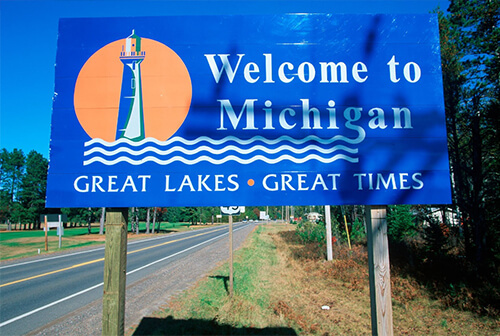Can I Apply for Title Loans in Michigan?
Yes, it is possible to apply for a title loan in Michigan and borrow against the value of your vehicle by using your car’s title as collateral for the loan. It is common for the terms “title loan” and “title pawn” to be used interchangeably, but they are not synonymous. If you are eligible for a title loan, you will be able to maintain access to your car or truck during the repayment process – even though you are required to use it as collateral for the loan! If you decide to apply for a title pawn in Michigan with a pawnbroker, they tend to keep your vehicle in their storage facility until you have completely paid off the loan.
Whether you are a resident of Detroit, Ann Arbor, or another city in the Great Lakes State, you can apply for a title loan online with your smartphone or computer!1
The average household income in Michigan is $63,202. When you are living in a household with more than two people, money can be tight if an unexpected expense arises and your emergency fund is not fully prepared. If you are a resident of Michigan and need some quick cash, title loans are a viable solution to consider. Call LoanMart at 855-422-7412 or continue reading to learn more about applying for title loans in Michigan.1 3
Where Can I Get Title Loans With Instant Approval in Michigan?

Online title loans in Michigan are meant to be fast and help qualified borrowers deal with emergency expenses. If you are thinking about applying for a title loan, you may be wondering if it’s possible to obtain title loans with instant approval in Michigan.
In most cases, you will not be able to find instant online title loans in Michigan. This is due to the fact that a title loan lender will need to verify the total value of the applicant’s vehicle and evaluate their ability to repay the loan during the loan application process.1 An applicant is required to provide certain documentation and undergo a vehicle inspection in order to apply for a title loan.
However, as a resident of Michigan, you can conveniently apply for a title loan serviced by LoanMart online and find out if you are eligible for instant pre-approval.1 3 All you will need to do is fill out a short prequalification form online, which takes just a few minutes! Click here to get started and get a loan quote with no obligation today.1 3
How Do Title Loans Work in Michigan?
Before you can learn more about the documents you will need to obtain loan approval, it is important to understand how title loans work in Michigan.
If you want to borrow against the value of your vehicle through an online title loan in Michigan, you must pledge the title of a qualifying car, truck, or SUV as collateral for the loan.1 Many different makes and models of cars can qualify as collateral for a title loan as long as they have a reasonable amount of positive equity.1
Typically, you can access up to 50% of your car’s overall value through a title loan, but the amount you will be eligible for partially depends on your ability to repay the loan.1
Once the loan is funded, a lien will be placed on your car’s title by the title lender. This means that the title loan lender has a legal right to your vehicle until you have completely paid off the loan. As previously stated, you will be able to keep driving your vehicle throughout the repayment period, but you must keep up with your title loan payments to avoid vehicle repossession. The lien is removed once you have paid off your loan!
If you have any questions about applying for car title loans in Michigan, feel free to give us a call at 855-422-7412 or visit the FAQ page to learn more.
Can You Get Title Loans Online With No Store Visit in Michigan?
While title loans can offer qualified borrowers the opportunity to borrow against the value of their vehicles, not all title loan options are created equal. As previously mentioned, an applicant is required to complete a vehicle inspection during their loan approval. Getting title loans with no inspection in Michigan is inconceivable!
Some title loan options require you to go to a storefront location to complete a physical vehicle inspection. A lender needs to inspect the vehicle during a title loan application to determine whether or not it is suitable for an applicant to use as collateral for the loan. If your vehicle is in poor condition or has significant mechanical issues and is not roadworthy, a lender may decide not to offer you the financial assistance you need.
With LoanMart, you can take advantage of a convenient application that can typically be completed from the comfort of your home. Instead of driving to a storefront location, you can simply submit photos of your vehicle to complete a virtual inspection! If you want to stay home, applying for title loans online with no store visit in Michigan is possible.1
What are the Title Loan Requirements in Michigan?
Whether you are looking for more information about title loan laws in Michigan or applying for a title loan, it is important to understand that the application criteria for title loans may differ from state to state.
Here are the initial title loan requirements in Michigan that you must meet in order to obtain loan approval:1
- Age Requirement: Prospective borrowers must be at least 18 years of age to apply for title loans in Michigan.1
- Vehicle Requirement: You must have a title to a qualifying vehicle in your name to apply for a title loan in the state of Michigan. If you are the rightful owner of the vehicle, but your car’s title is not currently in your name for one reason or another, simply head to your local Secretary of State (SOS) office in Michigan and request a title transfer to your name.1
- Income Requirement: In order to prove your ability to repay a title loan, you must provide proof of income or alternative income during your loan application.1
You will also need to provide the standard documentation that all state residents will need to qualify for an online title loan, which, when applying for a title loan serviced by LoanMart, will be the following:1
- A Valid Government-Issued Photo ID: You can easily prove your identity and age with a valid driver’s license, passport, or permanent resident card.
- Proof of Your Ability to Repay the Loan: Show us proof of your ability to repay the loan through recent pay stubs, bank statements, or other qualifying documents.
- Proof of Current Residence in Michigan: Most applicants will submit recent utility bills to prove their current address, but you can also provide lease agreements, mortgage statements, or credit card statements.
- Several Photos of the Vehicle: In addition to providing proof of a qualifying vehicle title, you will be asked to provide several photos of your vehicle during your application. Photograph your vehicle from every angle in clear lighting! Additionally, you must submit a few pictures of your car’s odometer reading and VIN (Vehicle Identification Number).
Additionally, all registered owners in Michigan may be asked to complete 2 documents:
- A Special Mailing of the Certificate of Title form (Which Needs to be Signed)
- An Application for a Michigan Vehicle Title (Which Needs to be Initialed and Signed)
Simply put, to obtain approval for a title loan in Michigan, you must be of legal age, have a car title in your name, and be able to provide proof of income.1
How Can I Get Title Loans With Bad Credit in Michigan?
Ready to apply for online title loans in Michigan? If you have a poor credit score, you may think that your financial history will hold you back. Having an undesirable credit score can prevent you from qualifying for many different kinds of financial products, including unsecured personal loans or credit cards.
A title loan is a type of secured loan that uses your vehicle’s title as collateral for emergency funding. Secured loans are much more flexible than unsecured loans, so applying for title loans with bad credit in Michigan is possible!1
While you cannot get title loans with no credit check in Michigan, you shouldn’t let your credit score prevent you from applying for the fast cash you need through a title loan!1 3
Take a closer look at the three-step application process to apply for a title loan serviced by LoanMart today:1
- Fill Out a Pre-approval Form Online or Call 855-422-7412 to Apply for a Title Loan
- Upon Initial Approval, Submit the Required Documents to Verify Your Information
- Get Your Money if You are Eligible for a Title Loan Serviced by LoanMart in Michigan!1
That’s how easy it can be to apply for title loans in Michigan! Click here or call 855-422-7412 today to find out if you are eligible for same day pre-approval. If you qualify for a title loan serviced by LoanMart, you can access your title loan funding in as little as 24 hours!1 3

Pay Back Your Title Loan Serviced by LoanMart in Michigan
Because Title loans serviced by LoanMart are so innovative, borrowers could receive advantages with the funding process. Title loans serviced by LoanMart allow eligible people to have access to emergency funding without having to travel too far.1
Title loans serviced by LoanMart allow eligible borrowers to repay their loans in a convenient way. No matter where you are in the state, chances are that there will be a MoneyGram location near where you live or along your daily commute.
Not sure where the closest MoneyGram location is to you? Check out the map below along, which features a dropdown list of a few MoneyGram locations throughout the state of Michigan:
Demographic and Financial Statistics for Michigan
The figures below are intended for informational and educational purposes to allow consumers to compare their financial situation to others in Michigan. Empowered with this data, we hope you can make a sound decision to solve your financial needs - if you decide that a title loan is a potential option, we’d be thrilled to assist you:
| Average title loan amount | $4,503 |
| Household income (median) | $63,498 |
| Income per capita | $61,144 |
| Rent (average) | $1,346 |
| Gross rent (median) | $1,037 |
| Value of housing units (median, owner-occupied) | $217,600 |
| Monthly owner costs (median, with a mortgage) | $1,521 |
| Monthly owner costs (median) | $587 |
| Student loan indebtedness (average) | $36,974 |
| Credit card indebtedness (average) | $5,787 |
| Size of monthly car loan payment (average) | $562 |
| Percentage of households that rent | 27.5% |
| Bank branches | 1949 |
| FICO® credit score average | 719 |
| VantageScore® credit score average | 710 |

